 The Pragmatic Craftsman
:: Simplicity from complexity : by Stanley Kubasek ::
The Pragmatic Craftsman
:: Simplicity from complexity : by Stanley Kubasek ::
 The Pragmatic Craftsman
:: Simplicity from complexity : by Stanley Kubasek ::
The Pragmatic Craftsman
:: Simplicity from complexity : by Stanley Kubasek ::
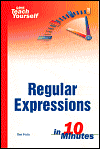
Sams Teach Yourself Regular Expressions in 10 Minutes
by Ben Forta
ISBN 0672325667
Date Read 5/2006
My Rating

This is a great intro book to regular expressions. The best, I would say. This is the first book I read on regular expressions. I loved the short-chapter style; I loved the examples and the referenced program to run them (though now I can run RE in Eclipse). Like I said, this is the best intro to RE, a valuable tool in your toolbox. For a more advanced book, Mastering Regular Expressions is considered a bible.
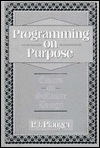
Programming on Purpose
by P.J. Plauger
ISBN 0137213743
Date Read 5/2006
My Rating

This book is dated, no question about it. However, it contains several excellent essays that are as relevant today as they were decades ago.
A lot of the techniques discussed in the book are no longer used. This was a book written in the days of structured programming. Those days are over. Thus, I found several of the essays boring. I could not put my full attention into them. They seemed dry.
Several essays in this collection were priceless, though. Worth buying the book just for those. Which Tool Is Next (Ch.7) is an excellent intro to software engineering. It contains several excellent analogies and definitions of software engineering. I think the best essays in the book are the last 5: the author talks about OO Principles and Software Engineering in general. The chapter on Encapsulation (Chp 21) is the best I’ve read. The chapters Heresies of Software Design (Ch 23) and Remedial Software Engineering (Ch 24) are just so “capturing.” They explain what works and do not work in software engineering. They define the whole software engineering industry.
Like I said, this book is dated. But because of the several excellent essays, this book is a keeper. Those essays are worth re-reading. The author is a great teacher, good writer. Most of all, the author speaks from his own experience (years of it).
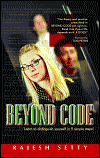
Beyond Code: Learn to Distinguish Yourself in 9 Simple Steps!
by Rajesh Setty
ISBN 1590791029
Date Read 4/2006
My Rating

This book is similar to My Job Went To India. However, it’s shorter and reads smoother. It focuses mostly how to improve yourself; how to distinguish yourself. The author has been there, and he tells interesting stories. He has excellent quotes in each chapter. Excellent book recommendations on the back.
Even though a lot of the information can be found elsewhere, the author presents it in an interesting way.
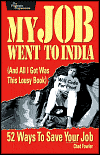
My Job Went To India
by Chad Fowler
ISBN 0976694018
Date Read 4/2006
My Rating

When I first looked at the book, I judged it by the title. I thought, what a stupid title. I did not even look into it. But then I saw recommendations from some people and overall good reviews. I jumped in, bought it, and read it.
If you are scared that your job might go to India, this is a required book for you. Otherwise, you will find a lot of good tips and valuable information that will help you become a better developer.
This book is a quick read. It cointains short 1-2 page chapters — 52 of them. Or you can call them “short lessons.” As I read, I kept telling myself: I need to do that, or I need to do that more often. Some info is common sense, but it serves as a good reminder.
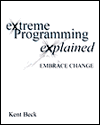
Extreme Programming Explained (E-book from ACM)
by Kent Beck
ISBN 0201616416
Date Read 3/2006
My Rating

Extreme Programming is a good, agile process. It is a disruptive force in the software community. Some XP practices are really good and worth adopting, and some are not so good, I think.
This is a well written overview of XP. If you just want to see what XP is all about, then this book is for you. It is a general overview of XP. For that purpose, the author does an excellent job. However, it’s just an overview, and if you’re looking for a lot of details, you might be dissapointed.
There is not enough detail. I want to see examples of the stories, I want to see the whole process actually work in a example from start to finish. I was not able to find that in this book. There is not enough detail for me.
If you want an overview of XP, this book is for you. If you want a lot of details so you can actually implement XP, look elsewhere. Overall, a good book on a software development process, and might help you improve your process.
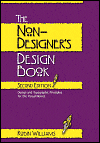
The Non-Designer’s Design Book
by Robin Williams
ISBN 0321193857
Date Read 3/2006
My Rating

It’s a great little book for people like me: I have no clue about design. I am not going to become a designer after reading this book, that’s for sure. But I liked the book. I gained some “design” knowledge. I know — by name — the different aspects of design now: proximity, alignment, repetition, and contrast. I’ve also validated some of my thoughts on design. A good, handy book. It’s an easy and a quick read.
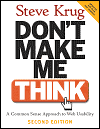
Don’t Make Me Think
by Steve Krug
ISBN 0321344758
Date Read 3/2006
My Rating

This is a required reading for UI designers, web developers, and very useful for web users. That covers almost anybody, right? Written in a style that is accessible to anybody, so why not? Anywhere you fit in that group, you will benefit.
Think about yourself as a web user. When you visit a new site, what happens? Do you spend a lot of time figuring out where everything is, or do you quickly scan it then if you find you’re looking for, you click on it. I certainly follow the latter. And I’ve gotten frustrated a lot of times when a site is making it hard for me to see where I am, what the site is all about. I give up a lot of times. But I know, now, because of the book, that the site is badly designed. On the other hand, I appreciate the sites that just seem right instantly.
This book is very valuable. I learned how users browse (they scan). I learned what users don’t like (they don’t like fancy stuff). I learned what users like (standard, intuitive interfaces). I became a better user because I see this when I browse. I became a better developer, because I know that users don’t think and I try to make it as easy as possible for them. I think about that when I design an interface.
This is an excellent book. It is a quick read (you can even read it in a bookstore in one or two sittings). I bought the second edition, but it doesn’t differer too much from the first. This is the best, most intutive, and the shortest book on UI I’ve read.
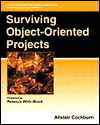
Surviving Object-Oriented Projects
by Alistair Cockburn
ISBN 0201498340
Date Read 2/2006
My Rating

It is a decent book, and the author has a good writing style, but I think this book is more geared towards project managers than software developers. I enjoyed it, it was a quick read, but never really “got into it.”
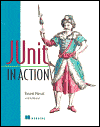
JUnit in Action
by Ted Husted, Vincent Massol
ISBN 1930110995
Date Read 2/2006
My Rating

This is a very good JUnit book, and a good programming book. There were a lot of things I liked, and some things I did not.
What I liked. This is the best JUnit book out there. It contains a lot of good advice. The author explains a lot of the best practices that every developer should be following. That’s good stuff. It is a very well written, easy to read. The examples in the book are very good as well.
What I think is missing. This is a comprehensive JUnit book. And it covers most of the topics that will be of interst to a tester. However, it does not cover HttpUnit (not that I would use it, but still). Plus, its coverage of Mock objects could be improved. This is a very important topic that should have its own chapter and be clearly explained. The book contains pieces of it, but not enough for me.
If you’re looking for a JUnit book, this is the book for you. (I want to get JUnit Recepies, but the book just looks and feels too big.)
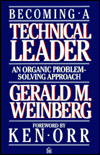
Becoming a Technical Leader
by Gerald M. Weinberg
ISBN 0932633021
Date Read 1/2006
My Rating

Even though I’m not the prime target of this book, I really liked it. Weinberg explains the different leadership styles with good detail, and with a pragmatic style. I learned a lot of what a good leader should be. This book made me better, as well. I started writing a 5-minute a day journal. I’m enjoying doing it. It helps me to learn of who I am, and what I want to become.
But who is the prime target of this book? I would say that if you have been managing a group of people, this is a must read for you. I am not a manager, but I would like to become one eventually, and this was a good book for me (not required, though). You would benefit the most from this book if you have had some experience leading. I plan to re-read it down the road.